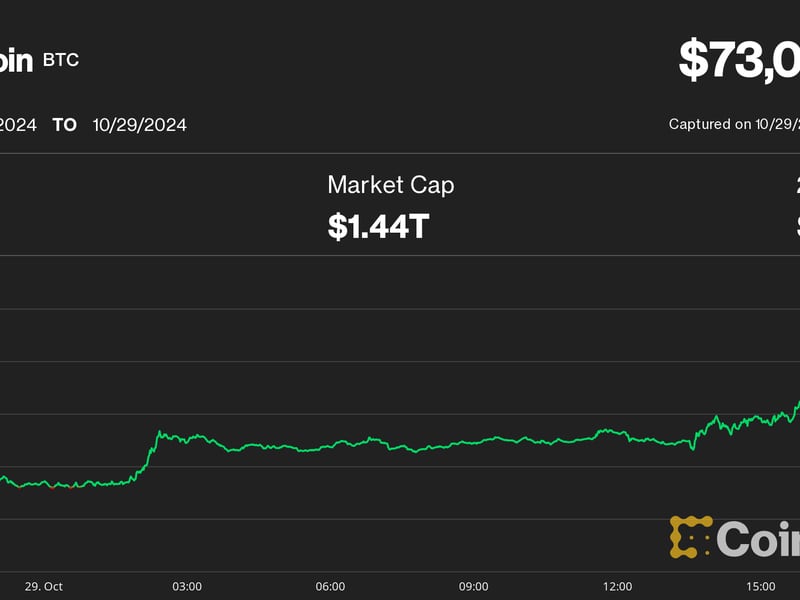Crypto Policy Didn’t Occupy the Spotlight in Elections in Austria, Georgia
-
Politicians in Austria and Georgia did not put a particular focus on crypto to sway voters in their elections, unlike the emphasis seen in Japan.
-
Georgia saw its ruling party the Georgian Dream Party get the most votes, and Austria’s far right Freedom party won in that nation’s parliamentary election.
-
In many other countries around the world, political parties chose to make their approach to crypto clear before elections commenced.

02:32
Microsoft Urges Shareholders to Vote Against Bitcoin Proposal

12:56
Bitcoin Option Volumes Soar, Institutions Eye $100K BTC Post-U.S. Election: Kaiko

11:20
Regulatory Game-Changer: OKX’s Crypto Expansion in Dubai

02:12
Solana Outperforming Amid Memecoin Frenzy
Political leaders in Austria, like other European Union nations, did not tap into the global crypto policy debate to sway voters during its recent election. In the run up to its election over the weekend Georgia, which has candidate status in the EU, was likewise quiet on the issue.
Nations such as the U.K. and others in Europe had already established how they wanted to regulate the sector before their elections, so little needed to be said about crypto before their polls opened. The U.S., where exchanges have been calling for bespoke rules, stands in stark contrast. Crypto has come up often prior to the Nov. 5 general election, and in Japan, politicians leaned on the need to reform crypto tax ahead of the general election which saw Japan’s ruling Liberal Democratic Party’s coalition lose its majority.
“Crypto and digital assets policy in the EU [European Union] isn’t really a partisan issue,” Mark Foster, EU policy lead at the Crypto Council for Innovation said. This was evident in the EU Parliament election, where no single party focused more on crypto issues.
Austria’s recent national election marked the far-right Freedom Party’s win in the Austrian parliament. The party won 29.2% of the vote and beat the ruling center-right People’s Party that came in second place with 26.5% of the vote. The winning party’s policies centered around immigration and the cost of living, but other Austrian parties have said they won’t work with it, leading to the nation’s President Alexander Van der Bellen asking the incumbent Chancellor Karl Nehammer to form a new government.
Politicians there did not lean into crypto discussions on the way to the Freedom Party’s parliamentary win. Austria is part of the European Union, a block of 27 nations that are already on their way to enforcing the Markets in Crypto Assets (MiCA) legislation, tailored rules for the sector. MiCA passed into law last year and will fully come into force in December.
Georgia, which cooperates politically and economically as an EU candidate, implemented regulations that required crypto companies to get registration in 2023. In the election over the weekend, voters chose to side with the ruling Georgian Dream Party, which secured around 54% of the vote. The elections were portrayed by parties as a choice between aligning further with Europe or Russia so, choosing the Georgian Dream Party signified a move towards the latter. The pro-European opposition parties are disputing the results.
However, the United National Movement (UNM) – a political opposition party in Georgia – recently joined up with Rarilabs to release a new blockchain solution for public administration leading up to the election.
Edited by Jesse Hamilton.
Disclosure
Please note that our
privacy policy,
terms of use,
cookies,
and
do not sell my personal information
have been updated
.
CoinDesk is an
award-winning
media outlet that covers the cryptocurrency industry. Its journalists abide by a strict set of
editorial policies.
CoinDesk has adopted a set of principles aimed at ensuring the integrity, editorial independence and freedom from bias of its publications. CoinDesk is part of the Bullish group, which owns and invests in digital asset businesses and digital assets. CoinDesk employees, including journalists, may receive Bullish group equity-based compensation. Bullish was incubated by technology investor Block.one.
:format(jpg)/www.coindesk.com/resizer/s18497Qm3Z2y-HO3cp7rBID5v2Y=/arc-photo-coindesk/arc2-prod/public/HC2J5TLYLFCRDEVA4SPLXUAIXI.jpg)
Camomile Shumba is a CoinDesk regulatory reporter based in the UK. She previously worked as an intern for Business Insider and Bloomberg News. She does not currently hold value in any digital currencies or projects.
Follow @camomileshumba on Twitter









